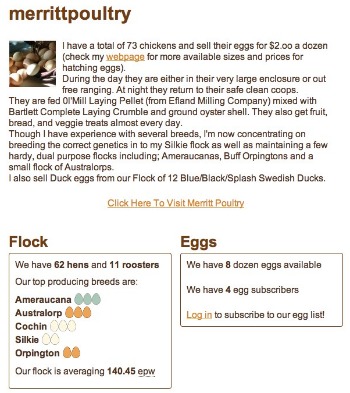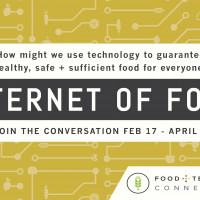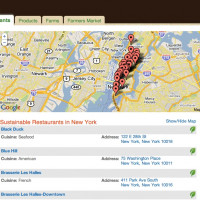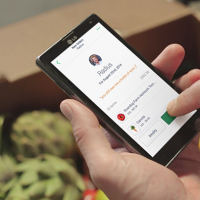Meet Sharleen and Mark Thompson, co-founders of Eggzy, a flock management platform for backyard chicken farmers that allows you to manage egg production, record expenses, calculate and project costs, and promote your flock. Through the “Egg Stands,” friends and neighbors are able to keep informed about egg availability, pricing, description of flocks, and other statistics. According to the site, they have tracked 74 flocks (956 hens in total) that have laid 2226 eggs over the last 30 days. They estimate that this could meet the daily protein requirements of 267 people.
While Eggzy is in its infancy, there are a number of aspects of the platform I find particularly intriguing. First and foremost, Eggzy is a flock management tool, but by tracking important information about the egg production process, the platform could improve traceability and transparency. After last year’s egg recall, it’s not difficult to make a case for why this is important. Additionally, the wealth of data being aggregated about little-known information (such as the size of the movement and chicken breeds) could be used to affect policy and support better research. Both of these use cases are of course contingent on how the Thompsons and flock owners choose to share this data. I look forward to following as they continue to develop the platform.
I got a chance to catch up with the Thompson’s and learn more about how their platform helps to support the local food movement and increase transparency, the business models they are exploring, and their development approach.
______________
Danielle Gould: What is the inspiration behind Eggzy?
Sharleen & Mark Thompson: Our inspiration came from a few places; first was the realization that, despite living in an historically agricultural community with no less than two commercial orchards within our School District, the apples served in our kids’ cafeterias all come from out of state – sometimes even from out of the U.S. That just doesn’t make sense to us.
Then there’s the growing number of food-insecure households; not just in Philly, but in our home towns of NYC and Detroit as well – pretty much every urban center in the country – and rural areas too. And, of course, movies like The Future of Food and Food, Inc. really affected our world view, not to mention the regular diet of food-born illness reports, most of which are directly related to centralized, co-mingled food distribution systems. Mostly though, our inspiration comes from some of the community initiatives we’ve seen, like Just Food in NYC, Urban Farming in Detroit and Philabundance here in Philly. We’re also inspired by our friends who share our concerns, many of whom have gardens, bake or what have you.
When we first started keeping chickens, we got way more eggs than we could eat, so we started sharing our extras. This got us thinking really deeply about home- and neighborhood-scale production and how it could help with some of the issues we were concerned about; like improving traceability by actually knowing who’s growing our food, food safety and security by having more diversity of sources, and generating local income to cover production costs, possibly more.
Theory in hand, we took a flock management tool we’d been working on for our own use and started building out the aggregation and subscriber features.
ST & MT: Essentially, Eggzy’s a marketplace where backyard chicken keepers can keep track of their flock and egg production, and people who are looking for local eggs can find them.
Flock owners enter their chickens and expenses into the system, and then, each time they collect eggs, enter those into the system as well. Eggzy automatically calculates production rates and breakeven, simplifying pricing decisions. Flock owners can also create their own online Egg Stand, where they can tell their story in words, stats and pictures, and let friends and family know when and how many eggs they have available.
Consumers can go to the Egg Stand listings and sort by zip code to find Egg Stands near them. They can also subscribe to their favorite Egg Stands to be notified whenever extra eggs are available.
DG: Are there any liability issues associated with selling these eggs? How do you ensure quality control and food safety?
ST & MT: There are liability issues regardless of whether you give away or sell eggs. There are also Federal, State, and sometimes Municipal regulations covering mandatory inspections, packaging and the sale of eggs. We recently wrote a post about regulatory issues for backyard flock keepers that goes into some detail about inspections, packaging and egg sales.
Food safety and quality control are a central tenant of our flock management tools. One of the guiding principals for the design of Eggzy is to regularly expose flock owners to ‘Good Agricultural Practices’ (GAPs) and to simplify and automate many record keeping, packaging and labeling tasks – tasks frequently overlooked by small flocks. We’re also constantly looking out for new info on Food Safety and post updates regularly to our blog and links on Food and Egg Safety in our resources section.
 DG: How does Eggzy increase traceability?
DG: How does Eggzy increase traceability?
ST & MT: This is a tricky matter, as while we want to optimize transparency and traceability, we also need to keep in mind that our flock owners and their subscribers are individuals and that privacy and security are paramount. We came up with the Eggzy Egg Stands as a way to create a public space for flock owners, where each can tell their own unique story about their flock and eggs, and where they can interface with their subscribers for commerce. The Egg Stands increase traceability by providing a face-to-face marketing venue for our flock owners and their subscribers.
We’re also in prototype with QR codes for cartons. We’ll be enabling flock owners to print labels with the codes that will link their egg cartons to their Eggzy Egg Stands. Consumers can scan the carton and go straight to the Eggzy Egg Stand of the source. The idea is to maximize traceability by elevating the relationship between the flock owner and subscriber.
DG: What are the business models you are exploring?
ST & MT: Given our multiple audiences, we’re exploring a variety of possible business models, including advertising & sponsorship and various marketplace e-commerce and cooperative models. With respect to e-commerce, we’re exploring several models including storefront and subscription models.
DG: What are the greatest challenges you’ve faced so far?
ST & MT: Emphasizing that these are in no particular order, we’d have to say that balancing development and outreach, self-funding and being married to your business partner have all certainly been challenges.
But perhaps the biggest challenge has been communicating the concept that Eggzy is about more than just backyard eggs and chickens; it’s about paying more attention to where our food comes from and taking responsibility for our own food supply; and about creating opportunities for those who do. It’s about elevating home- and neighborhood-scale food production as a legitimate component of sustainably productive food system.
DG: You mentioned that becoming parents made you more judicious about where your food comes from. Why?
ST & MT: Like most first time parents, having a child affects the way you view just about every aspect of the world, and food was/is a relatively easy one to try to manage, if not control.
When our son was born, we were awed by his perfection and couldn’t imagine giving him anything (knowingly) that was imperfect. Like so many others, we made our own baby food from scratch; from fruits, vegetables and meats we bought at health food stores or farmer’s markets. What wasn’t homemade was ‘organic’ , even if it meant paying a premium.
Mark took it to the next level by wanting to grow and produce as much of our own food as possible, and to have the kids involved in the food creation process so they would be better informed about food as a whole; where it came from, how it grew, the impact of seasons, weather, and nutrition.
______________






